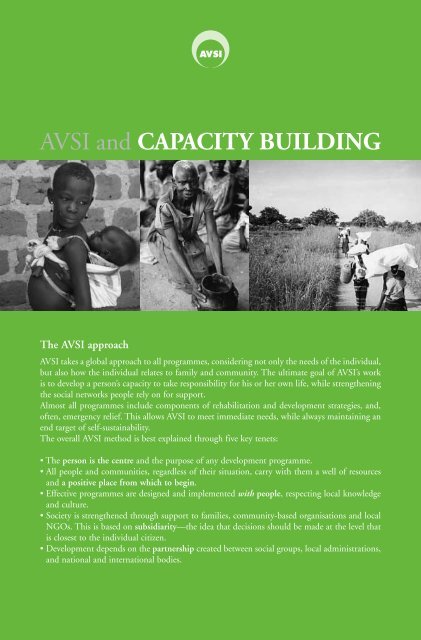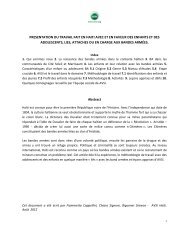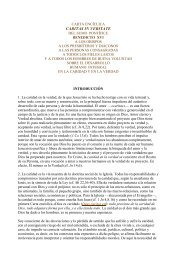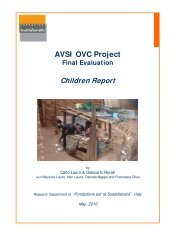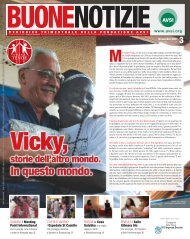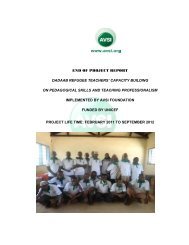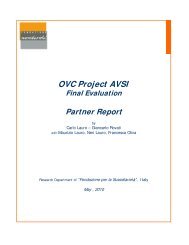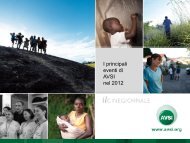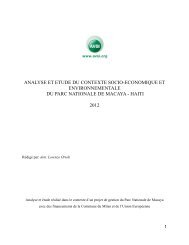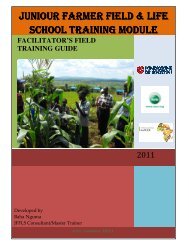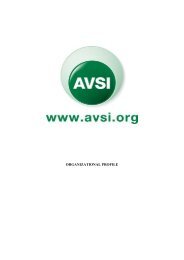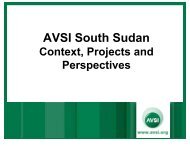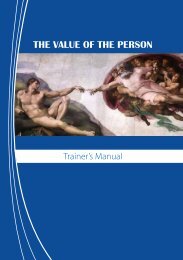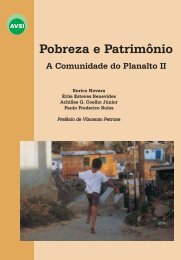Pamphlet: AVSI and capacity building
Pamphlet: AVSI and capacity building
Pamphlet: AVSI and capacity building
Create successful ePaper yourself
Turn your PDF publications into a flip-book with our unique Google optimized e-Paper software.
<strong>AVSI</strong> <strong>and</strong> CAPACITY BUILDING<br />
The <strong>AVSI</strong> approach<br />
<strong>AVSI</strong> takes a global approach to all programmes, considering not only the needs of the individual,<br />
but also how the individual relates to family <strong>and</strong> community. The ultimate goal of <strong>AVSI</strong>’s work<br />
is to develop a person’s <strong>capacity</strong> to take responsibility for his or her own life, while strengthening<br />
the social networks people rely on for support.<br />
Almost all programmes include components of rehabilitation <strong>and</strong> development strategies, <strong>and</strong>,<br />
often, emergency relief. This allows <strong>AVSI</strong> to meet immediate needs, while always maintaining an<br />
end target of self-sustainability.<br />
The overall <strong>AVSI</strong> method is best explained through five key tenets:<br />
• The person is the centre <strong>and</strong> the purpose of any development programme.<br />
• All people <strong>and</strong> communities, regardless of their situation, carry with them a well of resources<br />
<strong>and</strong> a positive place from which to begin.<br />
• Effective programmes are designed <strong>and</strong> implemented with people, respecting local knowledge<br />
<strong>and</strong> culture.<br />
• Society is strengthened through support to families, community-based organisations <strong>and</strong> local<br />
NGOs. This is based on subsidiarity—the idea that decisions should be made at the level that<br />
is closest to the individual citizen.<br />
• Development depends on the partnership created between social groups, local administrations,<br />
<strong>and</strong> national <strong>and</strong> international bodies.
Building <strong>capacity</strong> with partners<br />
In the early 1990s, Ketty Opoka <strong>and</strong> a h<strong>and</strong>ful of volunteers began dedicating themselves to caring for people living<br />
with HIV/AIDS, providing guidance for children orphaned by the disease, <strong>and</strong> spreading awareness in their community in<br />
northern Ug<strong>and</strong>a. Today Ketty <strong>and</strong> her colleagues in Kitgum represent one of four Meeting Point offices in Ug<strong>and</strong>a,<br />
community-based organisations that support those who suffer in isolation <strong>and</strong> silence.<br />
“We are all going to die,” says Ketty. “Having HIV means that death might come sooner; but the question is, ‘How did<br />
I want to live before? How do I want to live positively with HIV?’”<br />
<strong>AVSI</strong> works closely with each Meeting Point branch through programmes of food, medical <strong>and</strong> educational support for<br />
people living with HIV/AIDS <strong>and</strong> their families. Meeting Point-Kitgum, where Ketty serves as chairperson, is one of 27 local<br />
partners that make <strong>AVSI</strong>’s Distance Support Programme (DSP) for education possible. Spread across 15 Ug<strong>and</strong>an districts, these<br />
organisations help DSP cater to the academic needs of 4,000 children.<br />
By offering partnership, financial support <strong>and</strong> training opportunities, <strong>AVSI</strong> seeks to bolster the work of organisations<br />
like Meeting Point as well as individuals like Ketty Opoka. This cooperative method strengthens both parties, as Ketty explains<br />
in the following interview.<br />
Question: What is your definition of <strong>capacity</strong> <strong>building</strong>?<br />
Answer: To me, <strong>capacity</strong> <strong>building</strong> means to help a person. This could be in the form of training someone in job skills or an<br />
income generating activity. In the case of Meeting Point, it has meant training someone in office management, including our<br />
office accounts, as well as training women living with HIV/AIDS to manage <strong>and</strong> sustain activities that can provide them with<br />
an income.<br />
Q: As part of a local NGO, how have you seen <strong>capacity</strong> <strong>building</strong> come into practice?<br />
A: Meeting Point-Kitgum has been working with <strong>AVSI</strong>’s Distance Support Programme, a project that supports children<br />
orphaned by HIV/AIDS. One of these children has gone on to become a nurse, another an accountant, <strong>and</strong> many others are<br />
now working in jobs <strong>and</strong> supporting themselves. In them, the theory of <strong>capacity</strong> <strong>building</strong> has taken root <strong>and</strong> made a tangible<br />
difference.<br />
Q: Are there things that might not have been possible for Meeting Point without its relationship with <strong>AVSI</strong>?<br />
A: <strong>AVSI</strong> has given support to Meeting Point for several years. As a partner in the Distance Support Programme, individual<br />
foreign donors provide school fees for children orphaned by HIV/AIDS. <strong>AVSI</strong> also works with World Food Programme to help<br />
Meeting Point distribute food for people living with HIV/AIDS <strong>and</strong> their families. Finally, <strong>AVSI</strong> provides funds so Meeting<br />
Point can buy medicine to treat clients’ opportunistic infections.<br />
Q: Have you learned anything from <strong>AVSI</strong> that helps you in your work?<br />
A: By watching <strong>and</strong> working with <strong>AVSI</strong>, I think Meeting Point volunteers have seen a greater value in the lives of people we<br />
support. These are not mere beneficiaries or orphans; they are human beings with a need for love <strong>and</strong> dignity. This outlook helps<br />
us develop a friendship with people living with HIV/AIDS, children supported by DSP <strong>and</strong> all those we serve. This is something<br />
that’s unique to <strong>AVSI</strong>.<br />
Q: What things do you feel <strong>AVSI</strong> has learned from you?<br />
A: We compliment each other. Without Meeting Point, it would be difficult for <strong>AVSI</strong> to implement its programmes <strong>and</strong> reach<br />
a real grassroots level.<br />
Q: Have you gained anything from <strong>AVSI</strong> that helps you as a person?<br />
A: I think my work with <strong>AVSI</strong> has helped instill in me a deeper sense of responsibility in my life <strong>and</strong> work. I consider each<br />
orphan that comes to Meeting Point one of my own children. I follow them to their schools <strong>and</strong> homes, where I discuss their<br />
performance <strong>and</strong> their needs. I have come to recognize that we are not here to give school fees to a child <strong>and</strong> stop there. We are<br />
here to build a close relationship, a friendship, with each child.
Teachers <strong>and</strong> roads of discovery<br />
A volunteer teacher st<strong>and</strong>s before a small chalkboard in southern Sudan, a collection of 50<br />
primary school students at his feet. He calls out letters of the alphabet for the students to repeat: “A,<br />
B, C, D, E,” he shouts. “A, B, C, D, E,” they call back. The class works its way to Z <strong>and</strong> then begins<br />
again. There are no notebooks <strong>and</strong> no pens, so the pattern will continue for much of the day, <strong>and</strong><br />
the children will still seem grateful.<br />
Students in southern Sudan have grown up to a backdrop of war, in a world of uncertainty.<br />
Today, they watch shaky negotiations for ending the 20-year civil war that has killed an estimated<br />
two million people, <strong>and</strong> they ask whether it’s time to believe in peace. They remember planes that<br />
fly overhead <strong>and</strong> drop bombs, <strong>and</strong> guns that can catch you in the crossfire. They worry about<br />
Ug<strong>and</strong>an rebels that have carried their own war into southern Sudan. And they wonder whether<br />
today there will be food to eat.<br />
But in southern Sudan, where 75 percent of children are not enrolled in school <strong>and</strong> just 12<br />
percent go beyond the fourth grade, the hunger to learn can override other concerns. 1 The promise<br />
of education offers a hope here. It offers a reason to reject taking up arms, <strong>and</strong> it offers bigger dreams<br />
for the future.<br />
Many teachers in southern Sudan work as volunteers <strong>and</strong> a majority of them have no formal<br />
training in education. Classes often take place outside, with a blackboard <strong>and</strong> chalk as the only<br />
supplies. Despite the obstacles, local educators <strong>and</strong> administrators have started looking for ways to<br />
improve education. Theirs is a formidable challenge as Sudan emerges from years of armed conflict.<br />
While international agencies help respond to emergency needs, it is critical to maintain a view of<br />
education as a component of interventions. Education has the power to foster children’s inherent<br />
strengths, teach them how to protect their rights as human beings, <strong>and</strong> help build the cornerstones<br />
for a peaceful society.<br />
In 2003, the Diocese of Torit, long active in humanitarian relief in southern Sudan, helped<br />
coordinate a program of sponsorship for secondary students <strong>and</strong> a teacher-training workshop.<br />
Funding provided by the Italian Episcopal Conference was used to work with teachers to develop<br />
interactive lessons using local materials <strong>and</strong> to explore new teaching methods such as drama, debate<br />
<strong>and</strong> games.<br />
To help teachers better underst<strong>and</strong> <strong>and</strong> address the difficulties facing students in a region of<br />
conflict, the training sessions introduced psychosocial needs as a key consideration in education.<br />
Training in psychosocial needs, which is used extensively in northern Ug<strong>and</strong>a, focuses on how<br />
teachers can help children heal wounds. It is in this role—as a supportive presence for their<br />
students—that teachers in southern Sudan realize their full <strong>capacity</strong>.<br />
1 Number of students not attending school as estimated by the Consortium for Education <strong>and</strong> Training in Southern Sudan. Similarly, the<br />
U.S. Agency for International Development estimates that between 20 <strong>and</strong> 30 percent of school-age children are enrolled. Number that go<br />
beyond fourth grade taken from the U.S. Agency for International Development.
Technology as a tool for health<br />
In Ug<strong>and</strong>a, Catholic, Protestant <strong>and</strong><br />
Muslim medical bureaus run around 40 percent<br />
of hospitals <strong>and</strong> 28 percent of rural health units<br />
in the private sector. The Catholic Church<br />
alone accounts for 27 major hospitals in the<br />
country <strong>and</strong> 213 lower-level units. Its work<br />
complements that of the Ug<strong>and</strong>an Ministry of<br />
Health, which has exp<strong>and</strong>ed <strong>and</strong> rehabilitated<br />
health services in an effort to improve overall<br />
coverage in recent years.<br />
For private providers, to maintain<br />
operations <strong>and</strong> continue receiving government<br />
subsidies, it has become increasingly important<br />
to evidence the contribution made at the local<br />
<strong>and</strong> national levels. Ug<strong>and</strong>a, often hailed for its<br />
progress in fighting HIV/AIDS, is looking for<br />
what lies behind its success.<br />
Many health providers, while offering<br />
essential service on the ground, lacked the<br />
equipment needed to easily share data <strong>and</strong> the<br />
experience to analyse that data in depth. To<br />
meet their needs, <strong>AVSI</strong> teamed up with the<br />
local NGO Companionship of Works<br />
Association (COWA) <strong>and</strong> the Ug<strong>and</strong>a Catholic<br />
Medical Bureau (UCMB) in an effort to<br />
strengthen information, communication <strong>and</strong><br />
technology in Catholic health services. The goal<br />
of the project was to improve data collection<br />
<strong>and</strong> analysis, to gauge hospital performance <strong>and</strong><br />
to measure, where possible, the Church’s role.<br />
In the first year of the initiative, all of the<br />
Catholic hospitals <strong>and</strong> dioceses were sharing<br />
data through an electronic network; but it was<br />
clear from the outset that this was merely a<br />
preliminary step. Equipment alone meant little<br />
without an effort to strengthen human <strong>capacity</strong>.<br />
UCMB <strong>and</strong> COWA also made it a priority to<br />
train staff members at each location, who are<br />
now able to operate, manage <strong>and</strong> analyse<br />
collected data. In the end it is their work that<br />
makes a mass of statistics comprehensible <strong>and</strong><br />
relevant for UCMB <strong>and</strong> the Ug<strong>and</strong>a Ministry<br />
of Health.<br />
The government, taking note of the<br />
unique collaboration <strong>and</strong> information from<br />
Catholic hospitals <strong>and</strong> health clinics, has<br />
requested similar data collection from other<br />
private health care providers. The project laid<br />
the groundwork for future cooperation among<br />
private providers: An opportunity to make<br />
information more transparent; to better<br />
underst<strong>and</strong> strengths <strong>and</strong> areas for<br />
improvement in the health sector; <strong>and</strong>, in the<br />
end, to deliver improved services to patients<br />
countrywide.
Pillars of <strong>capacity</strong> <strong>building</strong><br />
In social teaching, subsidiarity refers to the belief that<br />
decisions should be made <strong>and</strong> actions taken at the level closest to<br />
the individual citizen. This preserves a person’s initiative,<br />
industry <strong>and</strong> ability to contribute to community, <strong>and</strong> nourishes<br />
a vital civil society.<br />
Subsidiarity—one of the cornerstones of <strong>AVSI</strong><br />
philosophy <strong>and</strong> methodology—is dependent on individual<br />
freedoms. If the individual, with freedom of choice <strong>and</strong><br />
association, is not maintained as the centre of development work,<br />
it loses both its purpose <strong>and</strong> its most powerful agent for change.<br />
The goal of subsidiarity is to strengthen a sense of<br />
responsibility in individuals <strong>and</strong> in organisations working to care<br />
for <strong>and</strong> develop their own communities <strong>and</strong> countries. This<br />
implies a partnership with local organisations, sharing tools <strong>and</strong><br />
methodologies, <strong>and</strong> placing trust in the people that development<br />
programmes are designed to benefit.<br />
To implement this methodology, <strong>AVSI</strong> turns to <strong>capacity</strong><br />
<strong>building</strong>—transferring knowledge <strong>and</strong> skills that offer each<br />
individual <strong>and</strong> community a sense of self-reliance. This means<br />
respecting the historical <strong>and</strong> cultural reality in which they are<br />
working, <strong>and</strong> how they wish to contribute. <strong>AVSI</strong> considers local<br />
human resources the first <strong>and</strong> most valuable tools of any project,<br />
<strong>and</strong> seeks to strengthen them by offering prominent programme<br />
components of training <strong>and</strong> education.<br />
Related <strong>AVSI</strong> activities<br />
Capacity <strong>building</strong> is integrated into all <strong>AVSI</strong><br />
programming <strong>and</strong>, in most cases, works at multiple levels. For an<br />
individual, it can take shape in vocational training, workshops in<br />
AIDS awareness for youth leaders, <strong>and</strong> courses to offer teachers<br />
theories <strong>and</strong> skills for the classroom. For an organisation, it can<br />
mean administrative <strong>and</strong> management training for staff, or<br />
participation in an international network of <strong>AVSI</strong> partners. And<br />
for a community, <strong>capacity</strong> <strong>building</strong> plays out in sensitisations on<br />
HIV/AIDS or a network of volunteers trained to identify<br />
vulnerable families <strong>and</strong> individuals. Behind all of it is the belief<br />
that helping people grow in consciousness of their own abilities,<br />
helping them to gain skills <strong>and</strong> work opportunities, helping<br />
them grow in their responsibilities <strong>and</strong> roles in society, will<br />
improve society in the long term.<br />
Experience from the <strong>AVSI</strong> network in Africa<br />
Companionship of Works Association (COWA)<br />
With its focus on vulnerable youth, COWA runs two vocational<br />
training centres in Kampala, Ug<strong>and</strong>a, <strong>and</strong> maintains a vital<br />
educational presence in the country’s main holding centre for<br />
juvenile offenders. Over the past 14 years, COWA has developed<br />
a training programme based not only in skills, but also in helping<br />
youth see the value of their own lives <strong>and</strong> the importance of their<br />
choices.<br />
Meeting Point-Kitgum<br />
Born in 1992 out of a companionship during illness, Meeting<br />
Point-Kitgum has become one of northern Ug<strong>and</strong>a’s key nongovernmental<br />
organisations working on behalf of people living<br />
with HIV/AIDS <strong>and</strong> their families. As a partner to <strong>AVSI</strong>,<br />
Meeting Point plays an essential role in delivering food support<br />
to vulnerable households <strong>and</strong> following the education of children<br />
orphaned by AIDS. Its work is echoed by sister organisations in<br />
the slums of Kampala <strong>and</strong> in Hoima, western Ug<strong>and</strong>a.<br />
St. Kizito Institute<br />
For more than a decade, this vocational training school has<br />
been offering young people a path out of the slums of Nairobi.<br />
As they study trades like carpentry, mechanics <strong>and</strong> tailoring,<br />
students are guided in entrepreneurial activities <strong>and</strong> connected<br />
with possible apprenticeships. Equipped with skills <strong>and</strong><br />
knowledge, young men <strong>and</strong> women leave St. Kizito better<br />
prepared to build their own futures.<br />
The Seed<br />
<strong>AVSI</strong> helped establish The Seed Remedial School in Lagos,<br />
Nigeria, the late 1990s, contributing to a national effort to<br />
combat urban poverty. On the outskirts of the city, The Seed<br />
offers remedial classes for youth who have been denied education<br />
for reasons linked to poverty, HIV/AIDS or conflict. A new<br />
educational centre brings children from different religions <strong>and</strong><br />
ethnic groups together to learn from each other, participate in<br />
group activities <strong>and</strong> practice living side by side in peace.
Associazione Volontari per il Servizio Internazionale (The Association of Volunteers in<br />
International Service-<strong>AVSI</strong>) is an international, non-profit, non-governmental organisation<br />
founded in Italy in 1972. <strong>AVSI</strong> holds general consultative status with the U.N. Economic <strong>and</strong><br />
Social Council in New York <strong>and</strong> the U.N. Industrial Development Organisation in Vienna. The<br />
Italian government <strong>and</strong> the European Union recognise <strong>AVSI</strong> as an NGO dedicated to<br />
international cooperation, <strong>and</strong> <strong>AVSI</strong> is registered as a private volunteer organisation with the U.S.<br />
Agency for International Development (USAID).<br />
<strong>AVSI</strong> promotes cultural, social <strong>and</strong> economic development, especially in the most<br />
disadvantaged in developing nations <strong>and</strong> countries in transition. Working in cooperation with<br />
local organisations, governments <strong>and</strong> international agencies, <strong>AVSI</strong> has programmes in 32<br />
countries of Africa, Latin America, Eastern Europe <strong>and</strong> the Middle East. In Africa’s Great Lakes<br />
Region, <strong>AVSI</strong> has been present in Ug<strong>and</strong>a for nearly 20 years <strong>and</strong> currently has programmes in<br />
Burundi, Democratic Republic of Congo <strong>and</strong> Rw<strong>and</strong>a. In sub-Saharan Africa, <strong>AVSI</strong> also has<br />
initiatives in Angola, Kenya, Mozambique, Nigeria <strong>and</strong> Sierra Leone.<br />
<strong>AVSI</strong> East Africa<br />
Plot no. 1119 Ggaba Road<br />
P.O. Box 6785<br />
Kampala, Ug<strong>and</strong>a<br />
Tel. +256.41.501.604/5<br />
Fax. +256.41.501.606<br />
E-mail: communication.kampala@avsi.org<br />
<strong>AVSI</strong> U.S.A.<br />
420 Lexington Ave., Suite 2754-55<br />
New York, NY 10170<br />
U.S.A.<br />
Tel./Fax. +1.212.490.8043<br />
E-mail: avsiusa@avsi.org<br />
PUBLISHED 2003<br />
<strong>AVSI</strong> Italy<br />
Viale G. Carducci 85<br />
47023 Cesena (Fo), Italy<br />
Tel. +39.0547.360.811<br />
Fax. +39.0547.611.290<br />
E-mail: cesena@avsi.org<br />
Via Melchiorre Gioia 181<br />
20125 Milano, Italy<br />
Tel. +39.02.674.9881<br />
Fax. +39.02.674.90056<br />
E-mail: milano@avsi.org<br />
<strong>AVSI</strong> on the Web: www.avsi.org


